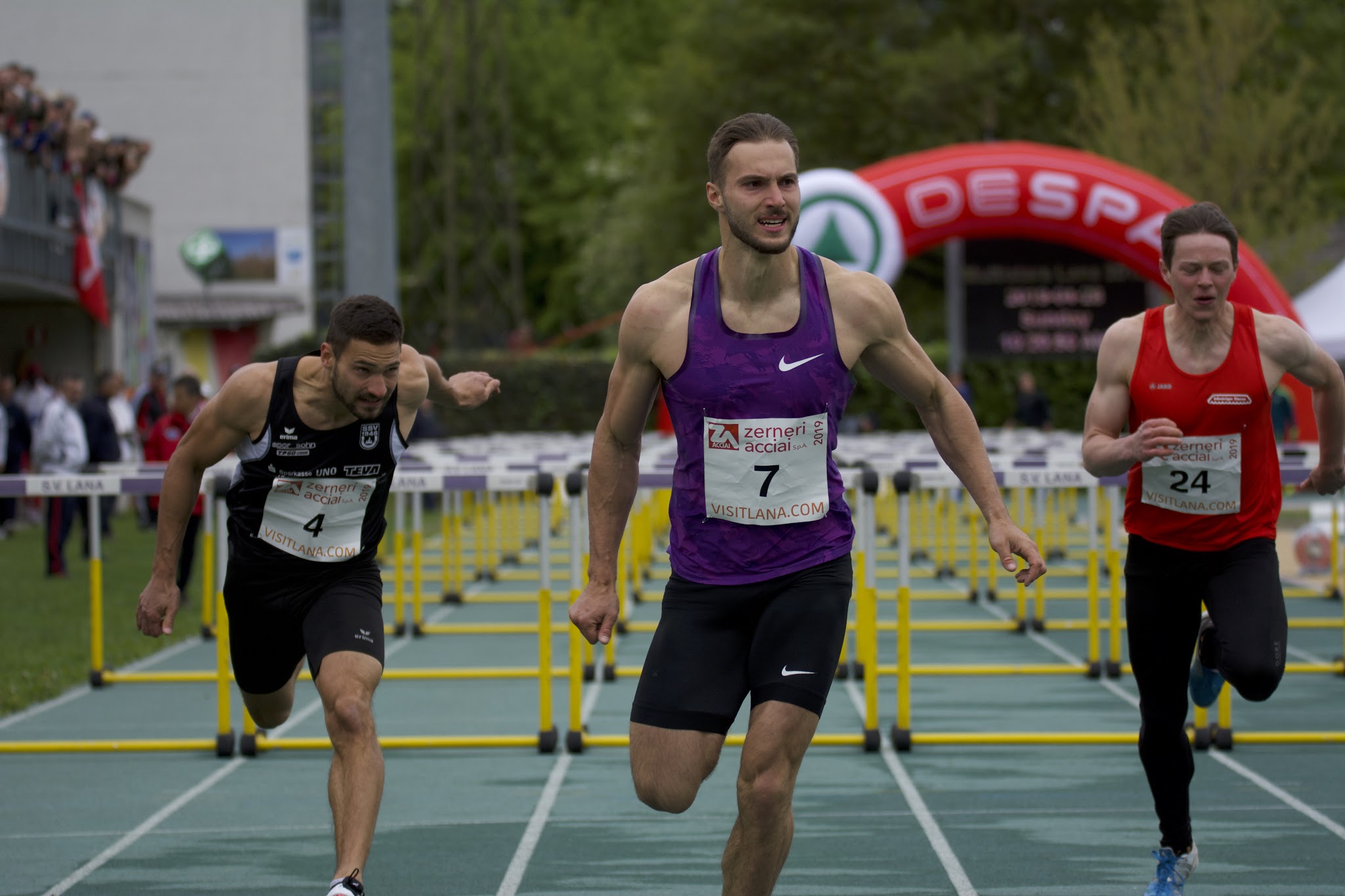The weekend of the 32nd meeting of Multistars started with words of welcome in Italian, but by Sunday evening the words of celebration were Czech.
One scenic venue. Two vastly different days of weather. Three Estonian high jump stars. Four continents. Five men predicted to go over 8000 after five events. Six decathlon personal best scores. Seven individual personal bests each, for two men under 23. Eight thousand one hundred and seventeen points for the Czech winner. Nine hundred and twenty points for the highest scoring events of the weekend from Norway and Japan. Ten out of ten to Lana for hospitality.
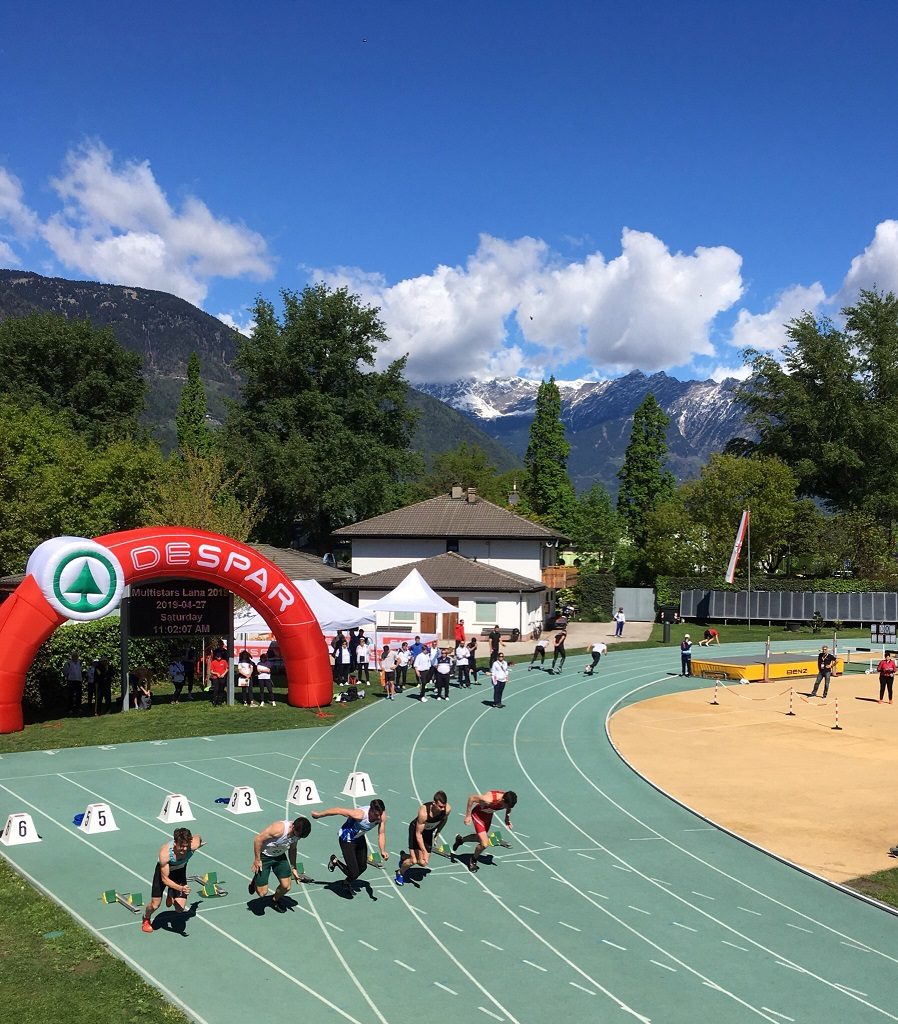
1 Uno
The torrential rain on Friday night in Lana did not bode well for the two days of Multistars, but Saturday morning dawned bright and clear. The 100m was bathed in sunshine as Risto Lillemets won the first heat in 11.32 and got the competition under way. Throughout the six heats, a robust headwind was in play, ranging from -0.6 to -1.8. And times were down a little from the previous year in Firenze, with early leader Martin Roe running 11.03 compared to his second-place time of 10.82 in 2018, although there was very little between the fastest in the field.
After 100m:
- Roe 854
- Maruyama 850
- Rosenberg 850
- Doležal 845
- Cairoli 843
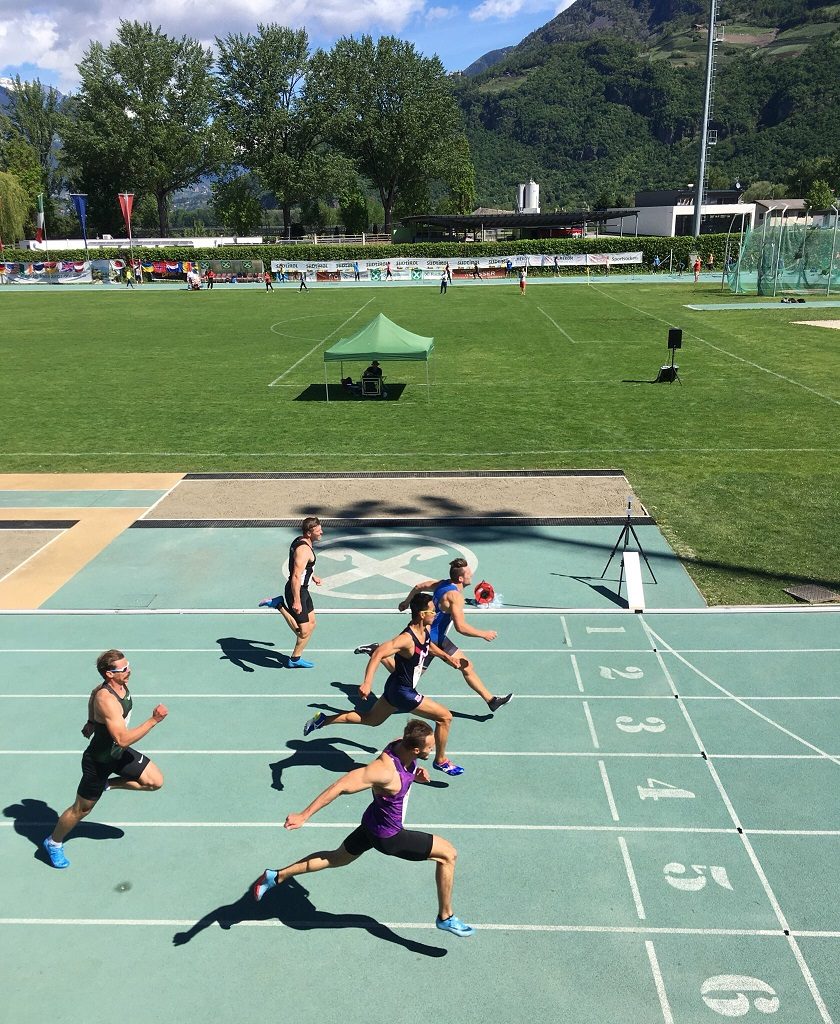
(Photo: Gabby Pieraccini)
1, 2, un, deux
The long jump runway pointed in the opposite direction from the 100m, but the wind had started to swirl. While some athletes benefitted from a feisty tailwind, others ended up jumping into a headwind. Only Jean-Baptiste Nutte and Risto Lillemets (more on them later) bucked the trend of low marks in the first and second events, and both logged personal bests in both the 100 and LJ, 11.13/7.20 and 11.32/7.04 respectively. The longest jump came from Martin Roe with 7.44, scoring 920 the equal highest points of the day.
After long jump:
- Roe 1774
- Maruyama 1738
- Cairoli 1726
- Doležal 1711
- Yaremich 1709
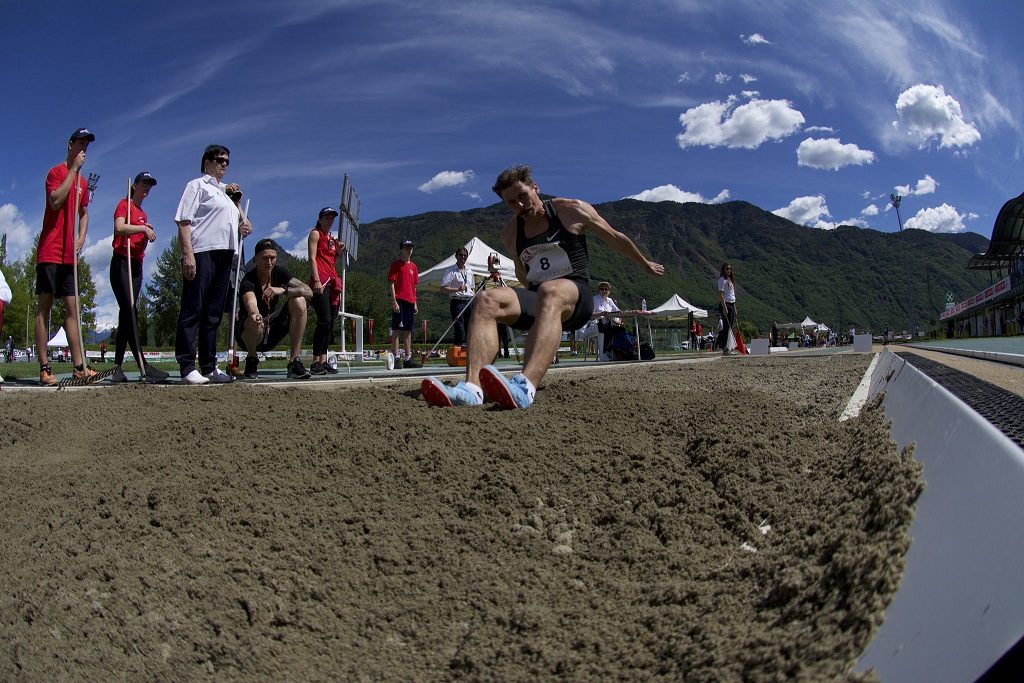
2, 3, dos, tres
So far in 2019 the shot has been the hot event, indoor and out. Back in March at the European Indoor Championships in Glasgow, half of the field of twelve improved their indoor bests. As far back as early February in Tallinn, Kristjan Rosenberg also improved his indoor shot mark to 14.23. Kristjan did the same here, throwing a massive best of 14.59, hinting that his indoor form was about to translate into good outdoor form.
Andrew Murphy split the difference between his outdoor and indoor PBs and scored a new best of 13.64m, and Belgian training partners Nutte and Dimitri Montilla also had a good day in the circle. The most significant performance in the competition came from Jan Doležal, however, going over 15m for the first time. But the biggest throw of all came in the second round, when Colombian José Gregorio Lemos Rivas broke Dmitriy Karpov’s meeting record by 40cm with a giant shot of 16.62. Lemos’ ability across the three decathlon throw disciplines is the stuff of statisticians’ dreams, and it was a genuine treat for spectators to see him in action.
After shot
- Roe 2543
- Doležal 2505
- Helcelet 2479
- Rosenberg 2467
- Lemos 2456
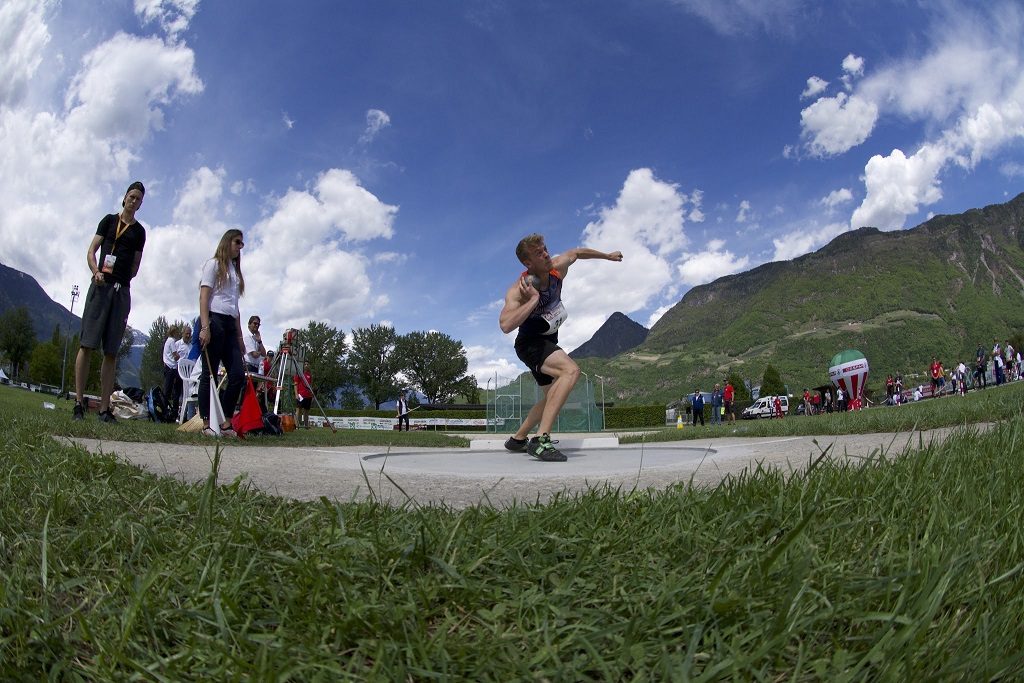
3, 4, kolm, neli
Over the course of the weekend, ominous rumbles echoed through the mountains surrounding Lana. Was it an imminent thunderstorm, or fighter jets on a training exercise through the valley? The mystery was solved as the high jump bar climbed above 1.95, and the Estonian Air Force arrived to put on an exhibition of spectacular aerobatics. Ultimately only three men remained across the two groups. They were all Estonian. None of them were Uibo, Õiglane or Saluri. Such is the depth of Estonian decathlon that Estonian Air Force 1 (Rosenberg) won the event with 2.10, at the top of his game and close to his lifetime best. Estonian Air Force 2 (Lillemets) was just behind him with 2.07, equalling his indoor best and 2cm short of his outdoor equivalent. And across in a Group B, Estonian Air Force 3 (Tšernjavski) was left on his own at 1.98. I asked Risto Lillemets afterwards what it felt like to be part of that Estonian tradition. “It makes me want to be better”, he said.
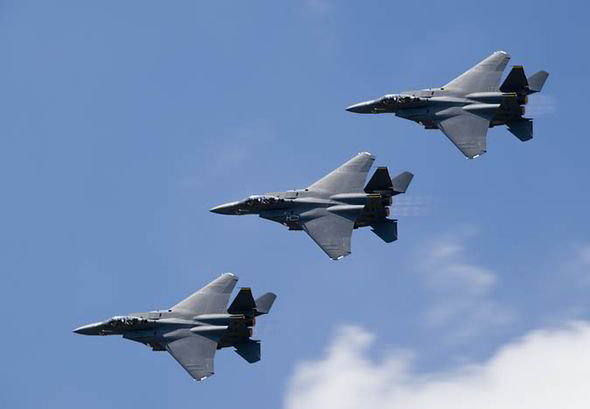
Tim Nowak jumped 2.01, Nutte 2.04, and Adam Sebastian Helcelet was delighted with his 2.01 clearance. Reinis Krēgers zoomed over 1.98 but picked up a slight niggle and withdrew after day 1 as a precaution.
After high jump:
- Rosenberg 3363
- Helcelet 3292
- Roe 3274
- Doležal 3263
- Nutte 3261
4, 5, vier, fünf
The 400 was always about Mathias Brugger, of course. 48.16 for his usual commanding performance, which moved him into the top five. But important developments were happening behind him. While Jean Baptiste Nutte went under 50 second for the first time, and Risto Lillemets took half a second from his previous best, the duel between Rosenberg and Doležal was starting to take shape. Doležal ran 48.65 and Rosenberg 48.87. Both faster than they had ever run before. Overnight, Rosenberg held the lead just ahead of Doležal. But Roe, Brugger, Helcelet and Nowak lay in waiting just behind them, with strong events to come. Nutte finished the day in an excellent third place, ahead of many more experienced names.
After 400m
- Rosenberg 4230
- Doležal 4141
- Nutte 4081
- Roe 4075
- Brugger 4073
5, 6, go, ruku
While on Saturday the pistachio-green track of Lana had been warm and welcoming, on Sunday morning it was damp with puddles. The temperature had dropped sharply overnight, and the stadium announcer shivered as she called out the names of the athletes for the 110m hurdles. The weather didn’t seem to bother Scot Andrew Murphy too much, who won the first heat easily in 15.27. “It felt even colder on Sunday, because it was so hot on Saturday”, he said afterwards.
But the hurdles belonged to Yuma Maruyama, speeding to 14.43, scoring 920 points, and moving up the leaderboard from tenth to seventh. Some drama ensued in the third heat, as Simone Cairoli and Taavi Tšernjavski clashed arms in adjacent lanes in the first half of the race. Cairoli was given the opportunity to rerun the race on his own half an hour later and improved his time to 15.04.
After 110m hurdles:
- Rosenberg 5061
- Doležal 5036
- Nutte 4981
- Brugger 4955
- Helcelet 4951
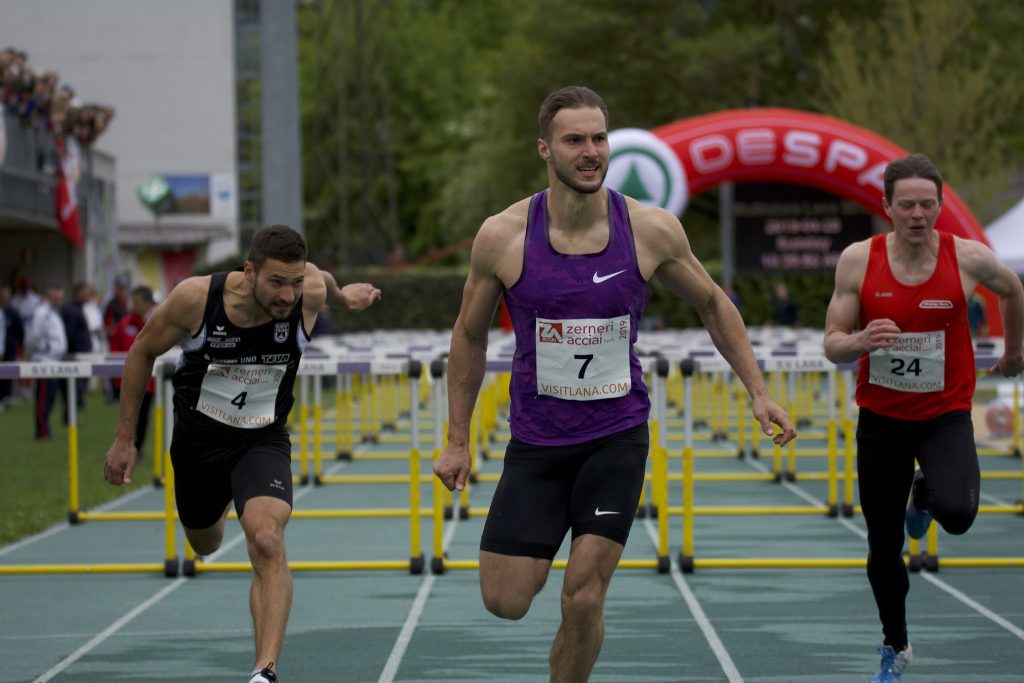
6, 7, seks, syv
Throughout the competition, Martin Roe looked solid, composed, in control of business. The discus was the third event he won, with 47.26, a feat rewarded by a presentation by former world record holder Tomáš Dvořák, in town for his twin daughters Barbora and Kateřina competing in the parallel heptathlon. However, behind him, the storm was brewing. Another PB from Rosenberg. Dolezal was not happy with his sequence of throws but nevertheless he overtook Rosenberg for the lead. Another PB followed from Lillemets.
After discus
- Doležal 5819
- Brugger 5766
- Rosenberg 5748
- Roe 5703
- Helcelet 5696
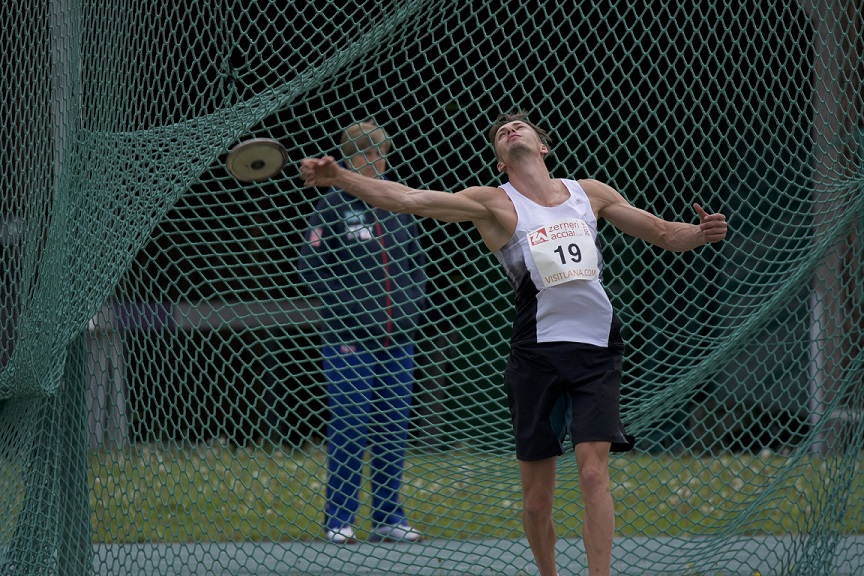
7, 8, sete, oito
The day didn’t get any warmer after lunch. On Saturday the crowd had huddled together in the few areas of shade. On Sunday afternoon they huddled together for warmth. Indeed, Taavi Tšernjavski took most of his vaults wearing a jaunty woolly hat complete with pompom. And again, in the air the Estonians made up ground. Rosenberg had some magnificent clearances, reaching 4.85 and defying the predictions suggesting he would fall back, narrowing the gap to 40 points behind Doležal.
4.75 was the significant height in the vault, halving the group from eight to four. While we did not get to 5.00m, that didn’t make the competition any less interesting. After a slow start in the 100m, Tim Nowak continued his pattern over the weekend of strength in the technical events and won with 4.95. But Brazilian Jefferson Santos had a nightmare, failing to clear his opening height of 4.35. It happens to the best. Sometimes the very best.
After pole vault
- Doležal 6653
- Rosenberg 6613
- Brugger 6570
- Roe 6507
- Helcelet 6471
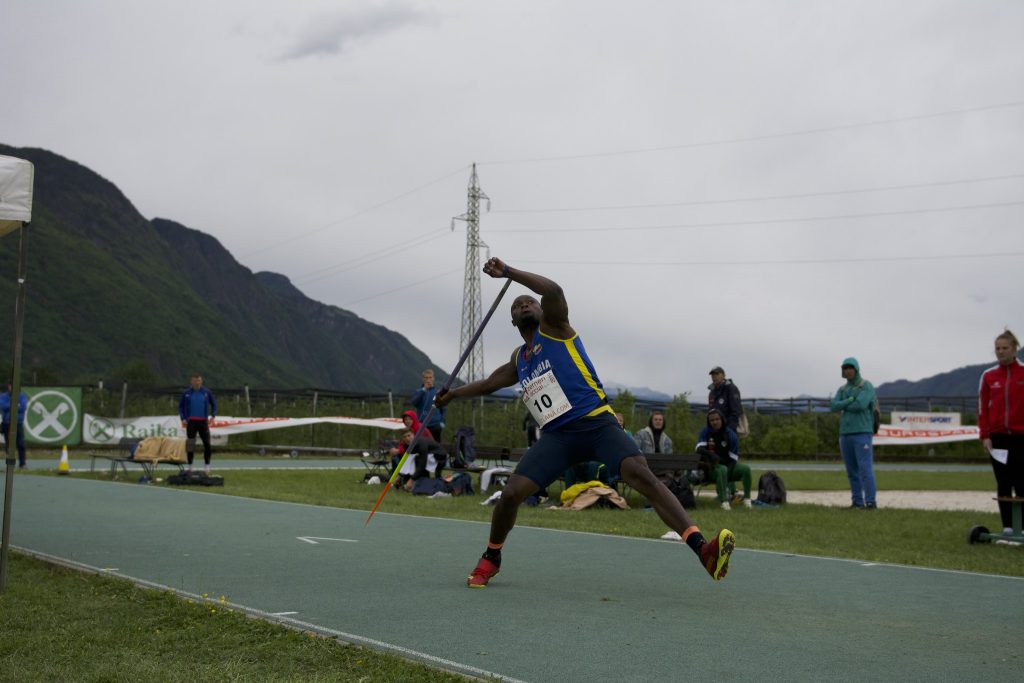
8, 9, osm, devět
It was not the jumbo javelin of José Gregorio Lemos Rivas that won the ninth event, but rather the jumbo javelin of Marek Lukáš. Over 70m at his best, Marek’s throw of 64.94 led the field and he began the climb up the leaderboard that would ultimately take him to a top eight place.
As the penultimate event drew to a close, the momentum of Doležal and Rosenberg had not waned. Doležal was very close to his javelin best with 62.50 and had stretched to a 184-point lead, equivalent to some 30 seconds in the 1500. But behind him Rosenberg and Roe were separated by only 8 points and had similar 1500 PBs around 4:31/32. Would Rosenberg’s form continue or would Roe’s consistency prevail? And behind Rosenberg and Roe, Helcelet sat in fourth, with Brugger and Nowak – a fearsome middle-distance pair – just a few points behind him in 5th and 6th. Would they hunt down Helcelet and Roe for a podium place?
After javelin
- Doležal 7429
- Roe 7245
- Rosenberg 7237
- Helcelet 7209
- Brugger 7195
9,10, devět, deset.
For a moment, it seemed like we had been transported to a Diamond League 1500m, as Adam Sebastian Helcelet took out the field in the style of Bram Som, with Brugger and Nowak in hot pursuit. In the end Helcelet didn’t complete the 1500m, and Nowak and Brugger surged ahead, Nowak finishing first in 4:27.38 and Brugger second in 4:32.00. Rosenberg followed in third, dipping for every last hundredth of a second on the line. Leaving nothing to chance, Dolezal set his third PB of the weekend, running 4:38.77 for an overall final score of 8117.
And so, the final positions were Dolezal in first (8117), Rosenberg second (7950), Brugger third (7927), Roe fourth (7917) and Nowak fifth (7884). While Nutte had brought the under 23-challenge on day one, Lillemets seized the baton and finished sixth (7707) after day two. Strong runs from Maruyama (7613) and Lukáš (7589) completed the top eight.
While these early-season marks will be unlikely to have the same impact as in 2018 – Roe set his highest mark of the year when winning – and the weather thwarted the mid-way predictions that five men would go over 8000, there are a number of fascinating clues to the season to come.
The momentum and new confidence of Doležal and Rosenberg, who were both achingly close to qualification for Glasgow but lost out by a handful of points to compatriots Sýkora and Saluri. The transition into senior ranks of Lillemets and Nutte. They each registered seven improvements to their personal bests and in addition Nutte equalled his long jump best. There is potentially an epic competition to come in the European Under 23 Championships in July alongside the likes of Johannes Erm, Andreas Bechmann, Niklas Kaul and Manuel Eitel.
There were flashes of vintage Helcelet in the long jump, shot and high jump. So much more still to come from Nowak and Brugger. The strength and consistency of Roe. The speed of Maruyama. The expiry date on Jamie Quarry’s Scottish record approaching if Murphy can carry his early 2019 form into the summer.
The multi-stars sparkled in the sunshine and glistened in the puddles of Lana.
Next stop on the Decathletes of Europe Tour: Hypomeeting Götzis on 25-26 May 2019.
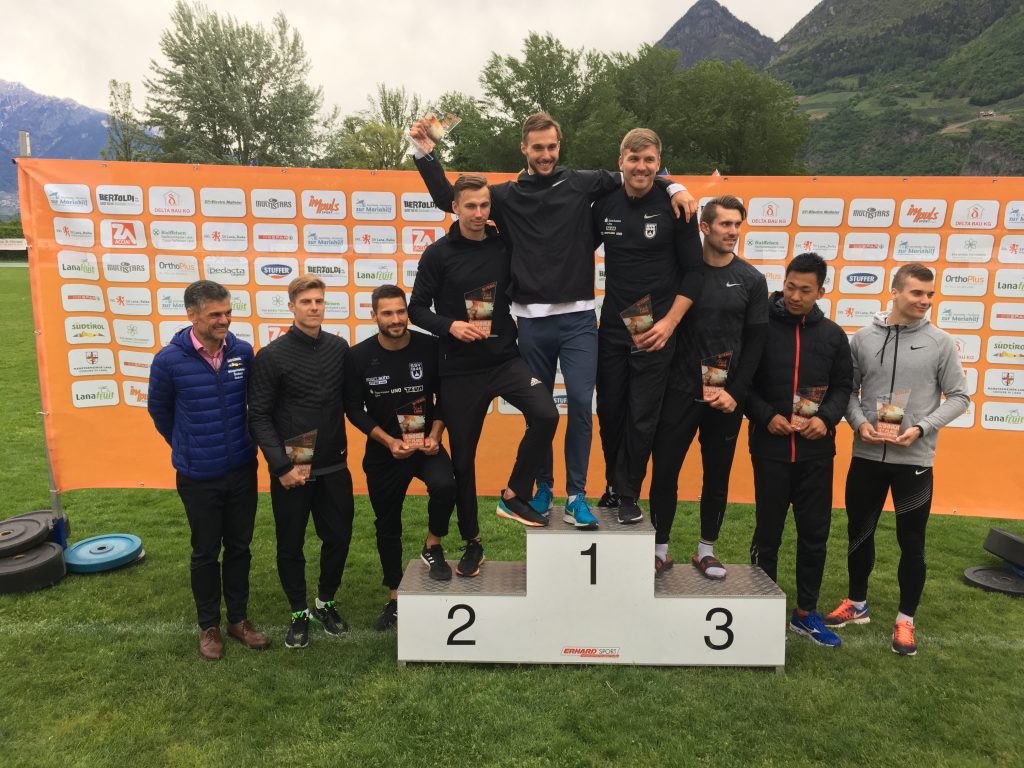
(Photo: Gabby Pieraccini)

